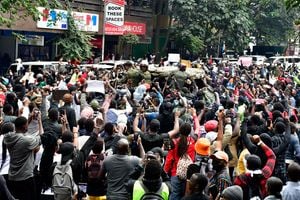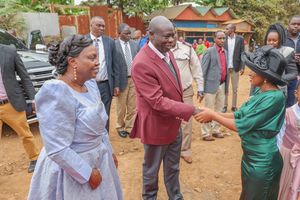
James Oyange, an activist who has been participating in protests, during an interview at Nation Centre, Nairobi, on July 20, 2024. He displays a spot where a rubber bullet hit him.
Fear is being sold to one James Oyange regarding his participation in ongoing protests, but the 27-year-old does not look like he will buy it any time soon.
“People ask me, ‘What are you going to do there?’ I’m like, ‘Why should I not go?’ They try selling you fear, but, at the end of the day, if it’s your day to join your ancestors, you’ll just go,” he says.
James was on the streets of Nairobi on June 25 when Parliament faced the wrath of protesters, and that was his second protest.
He was not too far from the Parliament Buildings when mobs gushed in. He was not too far from the young man who was shot near the legislative chambers. He has a mark on his right wrist where a rubber bullet painfully struck him that day, leaving it swollen for days.
Another memento from that day is a raincoat with two holes in it. The holes, he says, were caused by teargas canisters fired directly at him. He was lucky that they landed on his back — and that he had a bag on his back that absorbed the impact. He had changed clothes after finishing his day at an office where he was interning in Nairobi’s Upper Hill, put the “office” clothes in a bag, wore a raincoat on top of the “protest” clothes and headed to the streets.
He has been to several protests on the streets and is ready to show up on Tuesday or any other day, though he prays that things remain peaceful.
With a degree in international relations and having lost his job last year due to what he believes was victimisation, pushing for better terms for himself and his content moderation colleagues who were watching sickening videos marked for deletion from one top social media platform, James espouses the spirit of his generation.
“The fear is gone” is a line he used at least twice in our one-hour conversation.
Yesterday marked the first month since the first protester was killed on the streets of Nairobi. And Thursday will mark one month since the eventful day when protesters “occupied” Parliament.
It is history being encoded as more unfolds. Already, there is a Wikipedia entry titled “2024 Storming of the Kenyan Parliament” that has been receiving edits from when it was created on June 28 to when it was last updated on July 18.
New celebrities
The last month has produced new celebrities, new public enemies, new slang expressions (with a dance style to boot), and even new martyrs, depending on which side of Jogoo House one stands.
Since the protests began on June 18, it has been a month that has also turned the focus on the generation born between 1997 and 2012—Generation Z, or Gen Z. It is an open secret that the protests have been led by this group, which comprises at least 18.4 million Kenyans as per the last census (39 per cent of the population).
James was born in March 1997. He places himself in the group of Gen Z “firstborns”.
“We are the firstborns. So we need to make sure we represent them, and the ones that are following as well. That’s why I had to show up,” he told the Sunday Nation on Friday.
And, oh, James was a classmate of one of the emerging celebrities from the protests — Kasmuel McOure. They went to Maranda High School.
“He was a friend in high school. See that eloquence and all? That’s how Kasmuel is. I remember when he came from Alliance to Maranda, I was part of the people who were leading the music team, and Kasmuel revolutionised us. That guy could play the keyboard, he could play the saxophone, he could play the trumpet, he could play the violin. With his knowledge, he amplified us: revived the debating club, revived drama,” says James.
Clarion call
He is in the school of thought that wants the President out.
“We’re just fighting for a complete overhaul—every system. That’s why you hear ‘Ruto must go’. Yes, the individual has to go eventually. But also, it’s a clarion call to the system that is there—that it has to change. Now, it’s more about accountability and competence. We don’t want stories of this and that,” says James.
He is also not amused by the fact that Azimio leader Raila Odinga seems to be closing ranks with President William Ruto in relation to the protests, opining that Mr Odinga and his ilk are “tapping into our wave.”
Because of the killing of protesters, he is in support of the side that does not want to hold any talks with Dr Ruto.
“For me, it’s beyond now rejecting the Finance Bill. If we had achieved that with nobody being killed, I would have concluded that he (Dr Ruto) knows that ‘tuko kadi’. But people started getting killed, and people are still being abducted. So, why should we stop now? So if there is another protest, for me, I’ll 100 per cent be in it,” James notes.
His opinions represent many in his generation, although there are divisions among Gen Z on whether the time has come to call it a day and see what. Some religious leaders and other leaders have also urged the protesters to back down, but people like James would not take that.
“We will never go the Sudan way,” he says, adding that the Constitution stipulates clearly what should happen when the President vacates office.
James, who got his primary education in Kericho, his secondary education in Siaya, and pursued higher education at the United States International University-Africa, is but a yarn in the mighty rope of agitation whose convolutions are yet to end.









